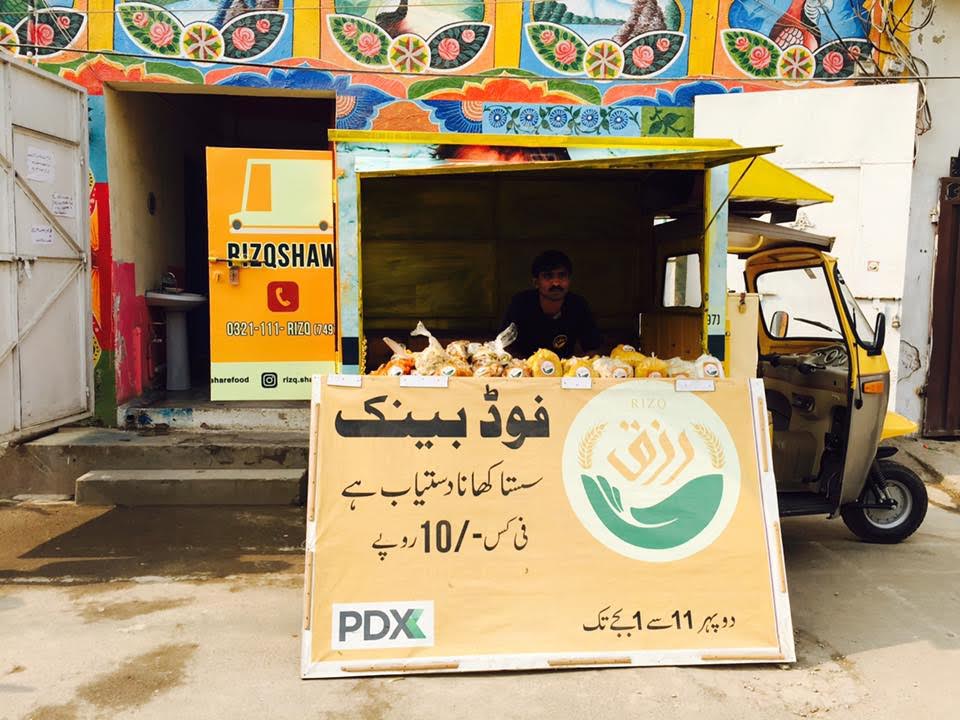Ramzan is a month that usually sees the best of people in Pakistan. There is something about this month that invigorates the feelings of sheer humanity, thoughtfulness and compassion.
Because at the end of the day, if an effort or a project end up doing something that benefits the needy, it really serves the purpose of the month which is also the true essence of Ramzan
One such social project is Rizq whose core objective is to channelise excess food from weddings, restaurants, or even homes to the needy.
The concept, which is relatively new in Pakistan, is run by a group of recent LUMS graduates, spearheaded by Huzaifa Ahmad, Musa Amir and Qasim.
Rizq has two primary objectives: To decrease food wastage that is rampant in our society and second, to feed under nourished people particularly children.
The inspiration for the initiative came from the trio’s mothers, especially Huzaifa’s. Rukhsana Izhar cooks for and serves food to hundreds of people at her house every day.
Rizq started in April 2015 while the three friends were studying in LUMS.

The Rizq team created a Facebook page detailing the plan of collecting food and distributing it among those who were in need.
Their page generated 5,000 likes overnight.The group received their first meal from a man who lived on Jail Road, Lahore.
He told the boys that his wife had cooked haleem for a feast and that they had quite a bit of it leftover and that he was happy for the Rizq team to collect it from his home.
Encouragement was all the group needed. The friends distributed 50-60 meals at a slum in Lahore and Rizq was operational.
As step one, the Rizq team identifies an area within Lahore and maps the community. These areas tend to be slums and villages.
Next, food drives are advertised on Rizq’s official Facebook page and website in order to encourage people to contact them if they have any extra or leftover food items from parties or otherwise to donate.
The Rizq team also ensures health remains top priority.
They have partnered with an NGO that conducts nutrition tests of people living in the area to ascertain needs and requirements.
Food is then collected from partner restaurants, bakeries, caterers and households.
The food usually comes in large containers, which is then taken to a store where it is checked for quality, and sorted into small packages for easy distribution.
On average, Rizq serves 200 to 250 meals everyday and aims to bring this up to 2000 meals per day.
When Rizq started, none of the founders thought it will grow as much as it did.
The magnitude of the problem of food wastage in Lahore convinced the team to keep expanding their initiative of eliminating hunger.
Rizq does not want to promote dependency and has started to charge a minimal fee for food packages.
People can buy food of their choice for as low as PKR 10 from the Rizq foodbank which operates in two shifts.
The first shift starts at 11:30 am and ends at 1:30 pm while the second shift starts at 3:00 pm and ends at 4:00 pm.
To make meals available to a larger number of families, there is a restriction on how many meals one family can purchase at one time.
During Ramazan, Rizq targets to arrange 2-3 Iftar dastarkhwans on different locations each day to make food available for deserving people.
To expand, Rizq needs Rs 1.5 million to buy a cold storage van and a cold storage storage facility to manage larger quantities of food.
The team has been managing with fridges till now, which restricts them to sell/distribute food immediately.
Rizq dreams of making Pakistan a zero-hunger country and to achieve this goal, the young men are willing to sacrifice personal monetary gains and are focused on making this initiative sustainable so it can support itself and can continue to serve a larger number of people.
-
Security forces gun down 30 terrorists in multiple IBOs in KP: ISPR
-
MQM-P calls for new province in Sindh
-
US report validates Pakistan military edge over India: PM
-
Banned TTP poses serious threat to Pakistan security: UNSC panel
-
CM Afridi clarifies remarks on by-poll after ECP requests army deployment
-
Dubai sees 3.2m Pakistani passengers in 2025 as airport sets new milestone
-
Security forces kill 23 Indian proxy terrorists in KP's Kurram
-
Pakistan to construct island to boost oil exploration: report











